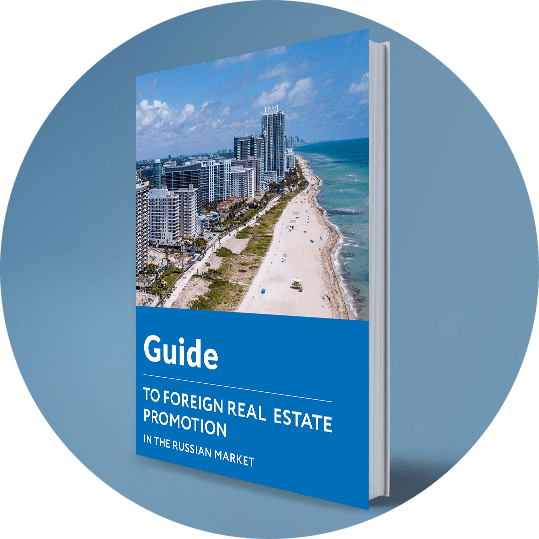Blog about successful marketing strategies in russia
Directional Overview: Where Russians Buy Real Estate Abroad


B2B MARKETING
Share this Post
In 2024, Russians' interest in purchasing foreign real estate declined by 24% compared to the previous year. The drop was driven by a 30% decrease in investment transactions and a 13% reduction in property acquisitions for residence permits or citizenship.
Despite the overall downturn, demand in Europe rose by 6%, reaching 26% against 20% the year before last. Interest also grew in Thailand, Georgia, Bali, and the UAE. Meanwhile, Turkey saw a twofold decline due to economic instability and soaring prices.
Let's go in order.
Leading Countries for Real Estate Purchases by Russian Buyers
This last year, there has been a notable increase in Russian interest in Asian destinations. Thailand led the demand for real estate, with 75% of all buyers' applications as estimated by Tranio. From January to March, Russian buyers purchased 9,300 properties in Thailand, according to Ricci | Foreign Real Estate. At the same time, there is growing interest in Indonesia, with current offers to purchase real estate in Bali.
The popularity of Asian destinations is driven by the availability of bank transfers from Russia, a robust remote transaction system, and the region's investment appeal. Additionally, real estate prices in Asia are often more affordable than in Turkey and the UAE. Since 2023, RMAA has been working with Thailand’s largest developer, Banyan Group Residences. We see that interest in real estate in Thailand remains consistently high, not only based on analytical data but also in practice. There are slight fluctuations in summer, but they hardly affect sales. Read more in our case study.
Another factor of interest to these locations is the growing presence of developers with Russian participation. These developers are adept at combining the features of local markets with the approach of Russian investors and buyers. Furthermore, it is important to consider the availability of direct air transportation between Russia and Thailand. Last year, direct flights from Moscow to Bali were launched. The first flight departed from Sheremetyevo Airport on September 17, 2024.
|
|
|
|
|
|
|
|
|
|
|
|
|
|
|
|
|
|
|
|
|
|
|
|
|
|
|
|
|
|
|
|
|
|
|
|
|
|
|
|
|
|
|
|
Georgia ranks second after Thailand. Last year, it welcomed 7.4 million travelers, marking a 4.2% increase compared to the previous year. This growth naturally impacts housing demand (+10%), particularly in areas popular with tourists. In 2024, foreign buyers accounted for 25% of real estate purchases, with Russians leading the way (24%)
Russian citizens choose Georgia not only as a travel destination, a place for emigration, or real estate investment but also as a business hub. As of June 1, 2024, approximately 37,400 companies owned by Russians were registered in the country, with more than 30,000 established after February 2022. Among them, 20,885 remain active, representing about 8.1% of all operating businesses in Georgia
So, what makes Georgia attractive to Russian entrepreneurs? First, business registration is straightforward and does not require a residence permit — only a passport from any country is needed. Second, the country offers a relatively low tax rate for small businesses — 1%, provided annual revenue does not exceed 700,000 GEL (approx. $243K). If this limit is exceeded in any month of the calendar year, the rate increases to 3%. Third, and most importantly, Georgia’s proximity to Russia facilitates logistics and business connections. Additionally, historical and cultural ties between the two countries help Russian entrepreneurs integrate more easily.
Nevertheless, the leaders of the previous 2023 and 2024, Turkey and the UAE continue to be of interest to Russians in terms of purchasing real estate, although with a decrease in demand. .The total number of purchase inquiries in the UAE (according to Tranio estimates) decreased by 21%, while in Turkey, it dropped by 25%.
At the time when demand for real estate in the UAE was at its peak, D&B Properties approached RMAA to attract Russian-speaking clients to Dubai's property market. To generate leads, we created targeted landing pages featuring Russian-speaking agents and a property catalog, organized a roadshow in Moscow that gathered over 100 attendees, and incorporated advertising tools on Telegram and VKontakte to expand reach. As a result, we attracted around 200 clients within a year. Later, interest from Russian investors in Dubai real estate began to decline, making it increasingly challenging to stimulate demand through marketing activities.
In 2024, the following trends began to emerge in the Emirates.
In the UAE, there is a demand for real estate in neighboring emirates with Dubai, which is just beginning to "open up" in terms of its potential. In Dubai, the volume of transactions in the secondary real estate market has increased (note: this includes so-called fix-flipping, which is the acquisition of secondary housing with subsequent renovation for resale).
In the UAE and Turkey, the demand for premium real estate remains strong, despite the sector's marginal position. It is important to note that these two countries will continue to be relevant for Russian buyers, investors, and tourists due to the presence of stable, established Russian-speaking communities.
The deterioration of political relations between Russia and some European countries has not affected the continued high level of interest among Russians in purchasing real estate. In 2024-2025, Greece, Spain, France, Czech Republic and Cyprus remain the leading destinations for Russian buyers. The primary motivation for them in these countries is to obtain a residence permit.
In turn, this demand has stimulated the immigration services market. Since 2022, the number of companies assisting with obtaining a residence permit (RP) through real estate purchases in European Union (EU) countries has increased. These firms handle all client needs, including property selection, organizing viewing trips, and even conducting online tours. They also provide support with document processing and complete legal formalities. The most well-known companies in this sector include Tranio, Migration Group, and Mircare.
Advertisement for citizenship-by-investment services in Greece from ASTONS on Solodnikov YouTube channel
In 2024, the Czech Republic emerged as a new player in the real estate market. The share of inquiries for property purchases in the country increased by 55%, reaching 4.1% of the total. This demand is driven by favorable investment conditions and attractive residence permit programs for financially independent individuals, foreign professionals, and entrepreneurs. In Prague, apartment prices range from €1,500 to €3,700 per square meter. In other regions, apartment prices vary between €850 and €2,000 per square meter, while houses cost between €450 and €800 per square meter.
Highly qualified professionals can apply for the EU Blue Card, which requires a university degree and an employment contract with a Czech employer. The minimum salary must be at least 1.5 times the average gross wage, approximately €2,250 in 2024. Wealthy foreigners can obtain a residence permit through a separate program, provided they have a stable income sufficient to cover all expenses. They must not engage in employment in the Czech Republic and are required to spend at least 183 days per year in the country.
Rules for Russians to Buy Foreign Real Estate
Basically, the rules on transactions involving the purchase of foreign real estate for Russians come down to the status of the country where the property is located. Such restrictions were introduced in 2022 for political reasons and remain relevant in 2025.
When purchasing real estate in countries friendly and neutral for Russia (Turkey, UAE, Georgia, Egypt, Indonesia, etc.), Russians are allowed to:
-
transactions with residents of that country;
-
transactions with residents of Russia with payment in rubles;
-
transactions with residents of unfriendly countries with payment to foreign accounts, information about which is disclosed in Russia.
In the case of buying real estate in countries unfriendly to Russia (Europe, USA, etc.), Russian buyers may also conclude transactions with residents of unfriendly countries through foreign accounts, information about which is disclosed in Russia. The procedure for working with the account is as follows:
-
opening a foreign account in a friendly country with submission of a notification of opening to the Federal Tax Service of Russia;
-
transfer of funds from Russia to the foreign account within the limit of $1 million per month;
-
payment for the purchase of real estate by transfer to the seller's account in an unfriendly country.
Useful Insights for Foreign Real Estate Sellers
The rules of the foreign real estate market have undergone significant conceptual changed for Russians in recent years, and these changes are ongoing, with the majority being for the better. Russian citizens currently face a number of challenges when purchasing real estate abroad. These include global shifts in investment patterns, the difficulty of transferring funds without restriction, and the impact of sanctions. These issues have gradually been addressed by new market players, offering buyers a full range of services for obtaining a residence permit and opening a bank account abroad.
Furthermore, fluctuations in currency impact the decision to purchase. Nevertheless, there is still a high demand for foreign real estate in Russia. The primary distinction between the two periods is the selection of locations.
The most popular countries for real estate purchase in 2025 are and will be those considered "friendly states," such as Thailand, Indonesia, Vietnam, the United Arab Emirates, and Turkey, which are viewed as highly profitable investment opportunities. European real estate will also remain a trend in 2025 for high-income Russians, just as it was two years ago.
It is of the utmost importance to consider these factors when marketing foreign real estate to the Russian-speaking audience. Potential buyers should be made aware of the profitable investments, citizenship opportunities, and attractive locations for life that are on offer. Each project is unique and requires the input of experienced specialists to complete a thorough analysis and practical work. To contact the RMAA team, complete the application form in the Contacts section.
Let's stay in touch! Subscribe to our newsletter to receive the latest information on marketing and advertising.
Join 2,000+
of your Peers!
You will be the first to know about Russian marketing insights, news and updates from our agency. Stay tuned!
Get our latest articles delivered to your email inbox and get our exclusive White Paper
"How to sell to Russian large companies?"
for FREE!
Foreign Real Estate Promotion in the Russian Market
How to market international properties to Russian buyers

Ready to partner with the specialists in Russian marketing and advertising?
About the Author
Digital Strategist. Head of one of the project groups at RMAA. Maria started her journey in digital marketing in 2009.
Join 2,000+ of your Peers!
Get our latest articles delivered to your email inbox and get our exclusive White Paper "How to sell to Russian large companies?" for FREE!
You will be the first to know about Russian marketing insights,
news and updates from our agency.
Stay tuned!
We're updating our website's design step by step, so some pages may look different. Thank you for your understanding.
Got it














